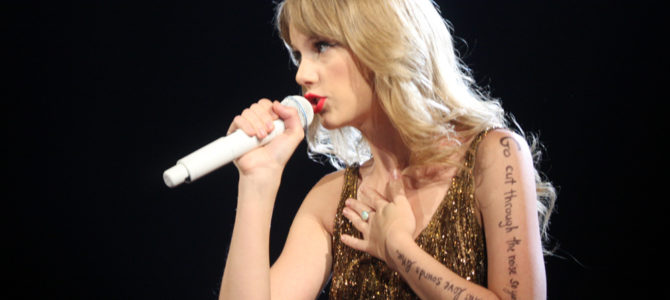
An idea came to me while I was listening to Taylor Swift’s new album. I have decided that this is not an embarrassing admission. Swift is one of the great marketers of our time, her music is catchy and well-produced and, doggonit, I like it.
High-school me would not be embarrassed either. I remember being in a car full of student athletes on the way to after school practice — windows down, “Love Story” blasting from the car radio. Teenage girls in sweatpants and sincere expressions, arms flailing out the windows, screamed more than sang “It’s a love story, baby just say ‘Yes!'”
It occurs to me now that we all liked “Love Story,” and many of Swift’s earlier songs, because we wanted to believe them, and we were so young and inexperienced at life that we did believe them, if only for a few minutes on the way to practice.
This is not to say that Swift’s earlier albums did not have realistic songs about love and loss. “Tear Drops on My Guitar” (2008) and “White Horse” (2010) come to mind. But there is a different tone compared to her latest albums. While the older songs deal with breakups and unrequited love, there is an air of disappointment in them that makes listeners believe things should have turned out differently. Maybe it is the air of a sincere idealism so common in girls that age.
This idealism seems to be gone from Swift’s newest album Reputation (2017) and even her last album 1989 (2015). In its place is a shrewd, calloused attitude that says, “I don’t have any dumb idealistic expectations about relationships anymore. Try to take advantage of me at your own peril.”
This first came through with Swift’s 2014 hit single “Blank Space” (“You can tell me when it’s over/if the high was worth the pain”) and is even more developed in her latest single “…Ready for it” (“Knew he was a killer/First time that I saw him/Wonder how many girls he had love and left haunted”). Many are chalking up this new T-Swift to your typical pop artist trying to mature their brand and grow their fan base. But I think there is another reason.
I see this callousness in the same girls screaming “Love Story” at the top of their lungs. They’re now twenty-something professionals and have experienced what this world has to offer in the way of romance for young women. That is to say, not much. We grew up with Taylor Swift and I think, in a way, her music has grown up with us. Her lyrics are in many ways a reflection of the experiences of millennial women from their wide-eyed teenage years to their post-college skepticism.
I do not think I need to convey to you how messed up it is out there for millennials looking for actual, respectful, adult relationships. Aside from the marriage rate dropping 22 percent in the last 50 years, recently there has been a new allegation of sexual harassment and even assault against an influential man almost every day. Most of us came to college looking for a “Love Story” and got offered a string of beer-fueled hook-ups instead.
As Heather Wilhelm suggested in National Review, women are just as much to blame as men for the current cultural quagmire. But the strangest thing is that, despite not challenging the status-quo, most women are not satisfied with the way things are. Instead, we are in some weird cultural version of a prisoner’s dilemma. We could individually expect more from our relationships, but there is the terrifying possibility that we will do so alone.
Another strange aspect to this is how most women do not realize how low their expectations have gotten. An assault survivor described this phenomenon aptly in the women’s magazine Verily: “For me at least, it was because, like a frog in slowly heating water, my sense of self-possession in sexual encounters had been dying over a period of time. By the time the rape happened, my radar was gone.”
While it may not always lead to becoming a victim of assault, many millennial women have slowly let go of expectation after expectation about how their dating lives, to the point where they are now in arrangements they would have never agreed to as an idealistic teenager.
But not all is lost. Most of us still have a spark of the hopeless romantic we once were when we listened to Fearless on our classic iPods. Taylor does too. On 1989 she sings about her hopes of rekindling “pictures in frames of kisses on cheeks.” Even in her latest album, there are plenty of signs the old Taylor is not dead.
Surprisingly, in her song featuring rapper Future and Ed Sheeran, “End Game,” Swift sings about wanting to be the sole object of someone’s affection, an expectation I’m afraid many have let go of.
Signs of the old Taylor are most noticeable in “Call it What You Want,” where she sings about finding someone who loves her like she’s “brand new.” I have taken an unscientific poll of the millennial women in my life and, overwhelmingly, this is their favorite song on the new album. Perhaps we need to take advice from the old Taylor and “just say yes” to our former 2008 selves.









